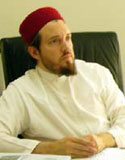‘Should Muslims Be Concerned About Haiti?’ by Shaykh Jihad Brown – The National (Abu Dhabi)
Should Muslims be concerned about Haiti?
by Shaykh Jihad Hashim Brown
Shaykh Jihad Hashim Brown is director of research at the Tabah Foundation. He delivers the Friday sermon at the Maryam bint Sultan Mosque in Abu Dhabi
Eleven-year-old Anna St Louis was going to be a lawyer. For three days she lay trapped beneath the rubble of a building in Haiti, her right leg crushed by a steel beam. “Lord God save me. I don’t want to die,” she cried out. Far from the capital Port-au-Prince, far from assistance, neighbours tried desperately to cut the beam with a hacksaw, while others gave her water. Her final rescue was covered by international news agencies, the town celebrated, Anna was grateful. With nothing more than painkillers to give her, the Cuban doctor volunteering in that area advised that she must be taken three hours away where more sufficient medical care could be given. Anna was brave enough to suggest her readiness to have her leg amputated. “I may lose my feet, but I will always have my life,” she has seen saying. But within 24 hours of being rescued, Anna had expired due to severe internal bleeding.
The first statement of the Prophet Mohammed to be taught to every student of Sacred Knowledge is: “Those who show compassion to others, compassion will be shown to them by the All Compassionate; show compassion to those in the Earth and those in the heavens will show compassion to you.”
Some will inevitably say that this does not apply to the non-Muslim. “We should only give our assistance to Muslims,” they will say. But an analysis of the above mentioned narration does not bear this out.
Another tradition of the Prophet Mohammed says: “God does not cease to assist his slave, so long as His slave does not cease to assist his brother.”
The premiere jurist of the 1950s Al Azhar, Muhammad Abu Zahra, says this is not limited to one’s brother in Islam alone, but in humanity in general. The Prophet Mohammed warned that whoever stands by and watches while the safety and dignity of another is being violated – while he has the wherewithal to help – God will leave him at the moment when his dignity and safety is threatened and he most wishes for rescue. Man is famously the caliph of God on Earth, and the believer is the caliph of the Prophet. But the “stewardship” through which we understand this caliphate is a concept of wide and expansive meaning. When we think – through history books – of Medieval international relations, we think of black and white stand-offs, of well-defined boundaries of “us-against-thems”.
We forget about how Islam was lived in actual communities – beyond the pages of cut-and-dry jurisprudential theory – where neighbours shared and cared across faith boundaries, and where they still do today, contrary to the pictures painted through grainy web videos, or their counterparts on 24-hour cable news channels. The world is no longer a place of regionally isolated towns and provinces; it is an expansive and vast community where the concept of stewardship and leadership needs to be bigger.
“Fear the prayer of those wrongly treated,” the Prophet said, “because there is no veil between them and Allah.” More often than not we think of this in terms of those who victimise us. Muslims should not forget to fear the prayer of those who suffer while they can alleviate it.
Much praise for the North American Muslim leaders who rallied and joined Shaykh Faraz Rabbani, the crew at Seekers’ Guidance, and Islamic Relief to alleviate the suffering of their beleaguered neighbours in Haiti this week; even more appreciation for all those who gave the US$105,000 (Dh386,000) in the first two hours online. Here is what it means to drink from the teachings of Mohammed.
